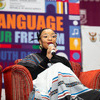Watershed student expedition along Great Kei
31 May 2013 | Story by Newsroom
Four UCT students will walk 500km of the Eastern Cape's Kei River in June, starting in the Great Winterberg Mountains and ending at the river mouth on the Indian Ocean. En route they will collect valuable water samples that will gauge the river's health and the impact of climate change - and at the same time, learn more about the social dynamics of communities divided by the river.
The four are part of a five-person team that will tackle Expedition Kei, a multi-layered, 30-day bio-monitoring assessment of the river and its ecosystem. Many rural communities and farms source their water from the Kei, and the team will look at how the river's water is sourced and distributed, whether from ground water, precipitation or runoff from other sources.
"This could potentially provide a framework to understand human impacts on the river, and potential implications for its future if it is not managed effectively," said participant Brandon Finn. Finn is studying environmental science and media.
Starting between Tarkastad and Queenstown, the expedition will be the first documented walk along the entire length of the Kei.
Earlier this year a UCT trio conducted the first full-length ecological census of the !Gariep, or Orange River, paddling from its source to the mouth on the Atlantic Ocean.
Science and research aside, the students are revelling in the opportunity to tackle a tough, physical expedition. This group will hike about 16km a day, carrying their resources on their backs. Replenishments will be available every five to six days at designated points along their route.
"It's part of human nature to want to pioneer, to imprint our presence on uncharted territory," said Finn. "This has been a strong driving force behind our project. There are some places people never get to."
His partners in the expedition are ecology student Dan Poultney (the brain behind the water research initiative), medical student Carla McKenzie, who is passionate about the merging of environment and health, social sciences student Stefano Maiorana (a former professional cyclist, which will stand him in good stead when the terrain gets tough), and Kim Harrisberg, a Stellenbosch University journalism student and adventurer.
Along the way they will fill 200 glass vials, plotting the GPS co-ordinates of each water collection point. The samples will be run through a spectrometer for hydrogen and oxygen isotopes. Professor Adam West of the Department of Biological Sciences will help the team assess the results and create a GIS map of their findings.
This will pinpoint areas of interest and concern. But it's about more than water; the river also creates a natural divide between two communities: the farmers on one side, and the Xhosa communities on the other.
"We're interested in the differences and similarities between the two," said Finn. These dynamics will be explored through photographs and interviews.
At 2 371m, the Great Winterberg is high enough for snow at this time of year, and the team has prepared accordingly. They're expecting rough terrain, waterfalls and detours through patches of Afromontane forest in the heights to the sub-arid, thorny bushveld below.
It's a taken a year of planning, including lengthy negotiations with landowners '“ the rural Xhosa community, and private property owners such as farmers and game farmers.
They've also completed a Venture Forth course in first aid and safety, as well as learned a few nifty tricks, like how to abseil with a rope that doubles up as a harness.
Last word comes from an entry on their website: "We are running and hiking in between trying to get our degrees, contacting farmers, planning food rations and pumping up our calf muscles."
 This work is licensed under a Creative Commons Attribution-NoDerivatives 4.0 International License.
This work is licensed under a Creative Commons Attribution-NoDerivatives 4.0 International License.
Please view the republishing articles page for more information.










